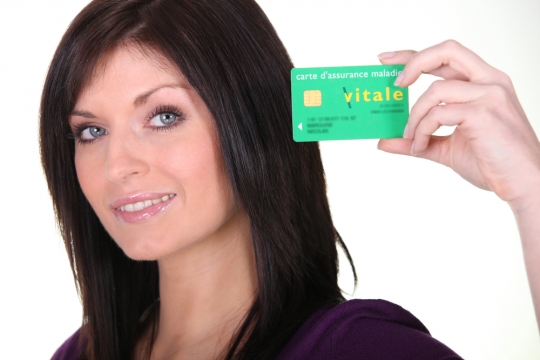The Carte Vitale is the national French health insurance card. Expats who qualify to register with the service benefit from having around 60 to 70 percent of their medical costs, including appointments, scans and prescriptions, covered by the state.Here’s everything you need to know about this very useful – although sometimes elusive – green and yellow card.
It Doesn’t Cover The Entire Cost Of Healthcare
As mentioned above, usually a maximum of 70 percent of your medical expenses will be covered with your Carte Vitale. However, this rises to 100 percent in serious cases such as heart disease or cancer. Any remaining costs come out of your own pocket.
Most people take out a private health insurance policy – independently or through their employer – which reimburses the rest. Learn more in our guide to health insurance in France.
You Can’t Get One Straight Away
Freshly arrived in France? Applying for your Carte Vitale should be on your to-do list, but there are a few other tasks to tick off first. Namely, sorting out where you are going to live and getting your proof of address, French bank account, employment contract or self-employment paperwork. You’ll need to be able to show that you’ve lived in the country for at least three months when you make your Carte Vitale application.
During this interim period, European citizens will be covered through their European Health Insurance Card (EHIC), while non-European citizens should ensure they have arranged private health insurance.
If you’re filling any prescriptions or attending any medical appointments in France over this time, be sure to have the doctor or pharmacist give you a feuille de soins – these brown forms can be sent in to claim some of your costs back later. It’s worth noting that you only have one year from receiving the form to lodge it and claim your money back so, don’t leave it too late!
You’ll Need A Lot Of Documentation
Applying for your Carte Vitale goes hand-in-hand with applying for your French social security number, which is usually done through your local CPAM (Caisse Primaire d'Assurance Maladie).
Non-European citizens not working in France as well as students over the age of 28 should apply to PUMa (protection universelle maladie). Those entitled to be covered by PUMa must pay contributions to Urssaf (Union de recouvrement des cotisations de sécurité sociale et d'allocations familiales).
If you run a chambre d’hôte (bed and breakfast) for a living, you should contact your local Chambre de Commerce and contact SSI (Sécurité sociale pour les indépendants such as healthcare for entrepreneurs). It’s worth noting that from 1 January 2019, those in this category will need to apply through CPAM.
The social security number application requires:
• the relevant form; this will vary depending on your personal situation, and more than one form may be required in some cases such as for retirees, or those on disability pensions in their home country. Guidance is provided per-situation, in English, here on the Ameli website
• a copy of your passport/ID
• a copy of your birth certificate and those of your family members
• a marriage certificate if applicable
• proof of residence; typically, a French rental/house contract and utility bill in your name
• proof of employment; a French work contract and your last three French payslips, or self-employment paperwork
• RIB or IBAN; your French bank account details.
Some departments require documents to be officially translated, others will accept them in English. It’s worth calling Ameli’s English helpline (they take calls from 8:30am to 5:30pm, Monday to Friday), or asking your local CPAM office directly to find out, before you spend money on pricey translations.
Receiving Your Card May Take A While
Some lucky people receive their social security number within weeks and so can apply for their Carte Vitale straight after. For others, the waiting time is a few months and in some extreme cases, years. CPAM offices in some locations are notoriously slow and require follow ups in person, while others are quite efficient. It’s worth connecting with other expats in your area so you know what administrative nuances to expect.
After lodging your application with CPAM, you’ll receive a temporary social security number in the mail. Bear in mind that it’s not uncommon to receive more than one temporary number before your permanent one shows up. You will also receive an attestation de droits (certificate of rights) which lists your temporary social security number. You can present this certificate at medical appointments and pharmacies to show you’re entitled to French health care. You can also use this letter to submit any collected feuilles de soins for reimbursement.
Once your file has been fully processed by CPAM, you will receive your permanent social security number and Carte Vitale application form in the mail. Your permanent social security number allows you to open your Ameli online account. This is a government health care portal where you can see the history of your appointments and reimbursements. You can choose to apply for your Carte Vitale through your Ameli account instead of by post; simply upload a headshot photo that meets the requirements and hit submit. Following this, your Carte Vitale card will arrive in the mail.
Register To Receive Reimbursements Automatically
Despite providing your bank details to CPAM, you may find that you’re not being reimbursed directly into your bank account, and you keep being handed those brown feuille de soins forms. Once you have settled on your preferred local doctor, the next important step is to have him or her sign a declaration de choix du médecin traitant, to formally declare them as your treating physician. This enables the system to reimburse your appointment costs directly to your bank account.
Have you lived in France? Share your experiences in the comments below, or answer the questions here to be featured in an interview!

